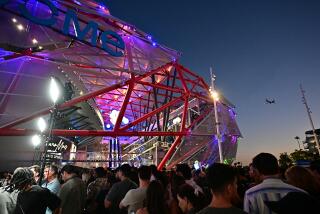Judge to Order Amphitheater to Lower Noise
- Share via
Ruling that nearby residents are captive to intrusive sounds from the Pacific Amphitheatre, a judge announced Friday that he will order the noise level in the neighborhood reduced so that the residents may regain privacy, health and a “comfortable enjoyment of life.”
The announcement promises for the first time some measure of peace and quiet for up to 24,000 Costa Mesa residents who live around the 18,000-seat outdoor amphitheater, which was opened in 1983.
“We’ve been hoping for this for some time,” said 60-year-old Russell Millar, who lives near the amphitheater and has gotten acquainted with the loud music of such rock ‘n’ roll bands as Oingo Boingo and Talking Heads.
Orange County Superior Court Judge Gary L. Taylor, after a hearing that was the latest in a long series of court actions, announced his intention to issue a preliminary injunction limiting noise levels around the amphitheater.
Heard Warnings, Then Music
He scheduled a hearing for next Thursday at which he will announce the details of the injunction. The order will address complaints of residents ranging from loss of hearing to increased stress and blood pressure that they attribute to the concert season.
“It (the judge’s ruling) is the result of a long effort, but it is clearly not over yet. We still have to go to trial” in an effort to obtain a permanent injunction, said Millar, president of Concerned Citizens of Costa Mesa, a neighborhood group that filed the lawsuit involved in Friday’s announcement.
Mubarak Khan, who recently moved into a house in the 2700 block of Lorenzo Lane in the Mesa Del Mar area, welcomed Friday’s announcement, even while admitting that she had been warned about moving too close to the amphitheater. Shortly after she moved, she said, she was introduced to “the noisy music.”
Taylor, in his decision, said that the noise generated by the amphitheater is beyond reason, “even in an otherwise noisy urban environment.”
Taylor found that the residents will probably succeed when a full trial is held on their claim that the amphitheater operations amount to a public nuisance.
“The noise is injurious to health, offensive to the sense, and unreasonably obstructs the free use of neighboring property. It improperly interferes with the comfortable enjoyment of life and property, and with the fundamental right of privacy,” Taylor wrote.
“We will appeal,” said Deborah Nesset, attorney for Ned West Inc., the firm that built and operates the amphitheater. Nesset said the judge could draft an order so stringent that the amphitheater would have to “shut down.”
“I don’t know what we will tell Ned West. Until there’s an actual order, it’s gonna be a problem, a serious one.”
The Kinks Due Next
Forty performances were presented last year. A total of 21 confirmed performances are scheduled this year, with the season beginning in earnest June 3 with The Kinks, a rock group. One concert has been staged so far, Eric Clapton’s on April 13.
No order will be issued against the state, which owns the county fairgrounds on which the amphitheater sits, Taylor ruled. Ned West Inc. operates on a 40-year lease, due to expire in 2021.
The state filed suit against Ned West last year, alleging that concerts exceed noise limits set forth in a county ordinance. The state has not pursued the case because its noise experts have been unable to segregate and measure the sound generated by concerts, compared to normal background noise.
The Concerned Citizens’ lawsuit on which Taylor ruled Friday was thrown out of court in 1984 but reinstated through successive appellate and state Supreme Court decisions.
Richard L. Spix, lawyer for the residents, told Taylor at an earlier hearing that 70% of the concerts violate county noise standards 95% of the time.
The conclusions drawn by Spix’s expert, Samuel Lane, could not be confirmed by noise specialists hired by Ned West and the state. Lane’s conclusions were hotly disputed by Ned West lawyers but apparently played a major part in Taylor’s decision to issue the injunction.
Until the order is drafted and signed, many questions about its actual impact remain.
Bond Costs Pose Hurdle
One potential legal mine field for the residents is the usual requirement that the side that wins a preliminary injunction post a bond to cover any losses the other side might eventually sustain. Spix has said the homeowners lack funds to purchase a bond.
“It’s going to have to be in the millions of dollars, . . .” Ned West attorney Nesset said. “The facility cost $11 million to construct, plus we have the shows. They’re all under contract. If they all fall out of bed, we’ll lose money.”
Some type of sound monitoring at nearby homes, and perhaps at the amphitheater itself, will be needed. Nesset expressed particular concern over whether performers themselves--Bob Hope and Frank Sinatra are among those scheduled this summer--will be subject to legal action if noise levels are too high.
Costa Mesa city officials actually ticketed performers on stage several years ago in an attempt to cut down on the noise. But a municipal judge dismissed the citations, ruling that they were improper.
“That has to be clarified,” Nesset said. “If it could be used against the performers, you might as well shut the amphitheater.”
While residents have also complained about the extra traffic generated on concert nights, their principal complaint remains noise.
Under the terms of its lease with the state, Ned West agreed to operate within the county noise ordinance.
Ned West contends that it has always complied with the ordinance, which limits noise in residential areas by time of day. At night, noise above 60 decibels--described as what can be heard in the average office--is restricted according to its duration.
“We’ve always been in compliance with (the) county ordinance,” Nesset said. “So I guess his (Taylor’s) order will go further.”
Most of the noise complaints are from Costa Mesa’s College Park area, which is southwest of the amphitheater, and from the Mesa Del Mar area to the northeast.
Concern About Parties
There was mixed reaction from some of the neighbors interviewed in those areas Friday. Some of them said they thought the noise problem was worse on the other side and some had been more concerned with the pre-concert and after-concert parties.
“It really doesn’t bother us too much. Once or twice, “ said Jim Hurtado, who lives in College Park. “But then we just don’t like to put up a fuss,” he added.
Henry Gomez, 30, said he has gotten used to living near a concert arena during his two years on Clearbrook Lane.
Sometimes when the group that is playing is one he likes, he said, he wishes they were louder. “I consider it a fringe benefit sometimes,” he said.
Millar, who is a political science professor at Orange Coast College, said the loud music has been stressful and aggravates his bad stomach.
While considering Friday’s announcement a victory, Millar cautioned against celebrating too soon.
“We’re not certain what the (judge’s) noise levels will be,” he said. “And we don’t know if (Pacific Amphitheatre) will comply.”
More to Read
Sign up for Essential California
The most important California stories and recommendations in your inbox every morning.
You may occasionally receive promotional content from the Los Angeles Times.









